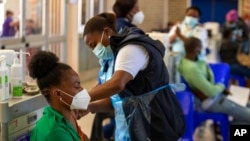U.S. drugmaker Johnson & Johnson announced Monday it has reached a deal to supply the African Union with up to 400 million doses of its COVID-19 vaccine beginning this summer.
The single-dose vaccine still must receive authorization from regulators in African countries. However, it has been approved for emergency use by the World Health Organization, European Union and United States.
A study released Monday by the U.S. Centers for Disease Control and Prevention (CDC) shows mRNA vaccines produced by Pfizer-BioNTech and Moderna are highly effective at preventing COVID-19 in "real world" conditions.
The study was conducted among nearly 4,000 health care workers, first responders, and other essential workers in six states between December 14, 2020, and March 13, 2021. The results showed the risk of infection was reduced by 80% after one dose and 90% after two doses.
AstraZeneca vaccine
In Canada, health officials said on Monday they would stop offering AstraZeneca's COVID-19 vaccine to people under age 55 because of concerns of rare but serious blood clots, especially in younger women.
"We are pausing the use of AstraZeneca vaccine to adults under 55 years of age pending further risk benefit analysis," Howard Njoo, Canada's deputy chief public health officer, told reporters Monday.
The pause comes after many European countries briefly stopped using the AstraZeneca vaccine while investigating the reports of blood clots. Almost all of them resumed using the vaccine after the European Medicines Agency (EMA) said the vaccine was "safe and effective" and said the benefits of the vaccine outweigh the risks of the side effects.
The EMA, however, said it could not rule out a possible link between the AstraZeneca vaccine and a small number of blood clots, particularly in younger women. France cited the EMA report in resuming its AstraZeneca vaccinations only for people 55 or older.
Origins of COVID-19
Also, a joint study by the World Health Organization and China on the origins of COVID-19 says the virus was most likely transmitted from bats to humans through another animal, according to a draft copy obtained by U.S. media outlets.
The draft report, which is expected to be made public Tuesday, said a lab leak is "extremely unlikely" as a cause of the coronavirus outbreak.
WHO Director-General Tedros Adhanom Ghebreyesus acknowledged Monday that he had received the report over the weekend but declined to confirm details in the draft copy seen by media outlets, including The Associated Press, which first reported the story.
"All hypotheses are on the table and warrant complete and further studies," Tedros told a news conference from Geneva.
WHO sent an international team to China earlier this year to explore the origins of the virus. But critics of that study say it was limited to only what China allowed them to see.
Mexico's numbers
The report comes as countries around the world continue to seek out vaccinations for their populations to try to stop the spread of the virus.
Late Sunday, Mexico received 1.5 million doses of the AstraZeneca COVID-19 vaccine, the Foreign Ministry said. The vaccines were part of the 2.7 million doses the U.S. promised its southern neighbor in a pact reached earlier this month between the two countries. The AstraZeneca vaccine has been approved for use in Mexico but has not yet been approved for use in the United States, which has stockpiled the shots.
Mexico reported 1,292 new confirmed cases of COVID-19 and 203 more fatalities Monday. The country has more than 201,000 deaths from the virus, behind only the United States and Brazil.
The country recently revised its death toll upward by 60% following a government review of death certificates to account for those who died in their homes. The new statistics are staggering, as the Mexican population of 126 million is far below the populations of the U.S. and Brazil.







